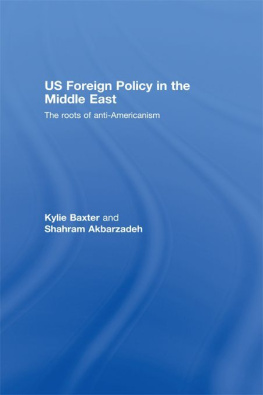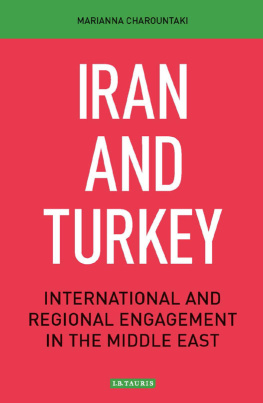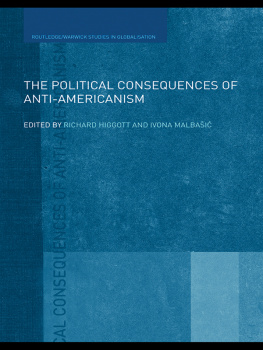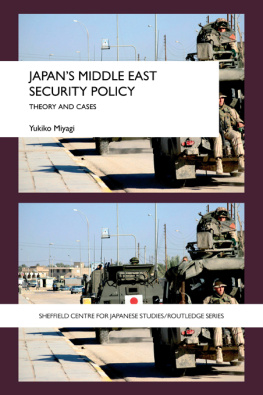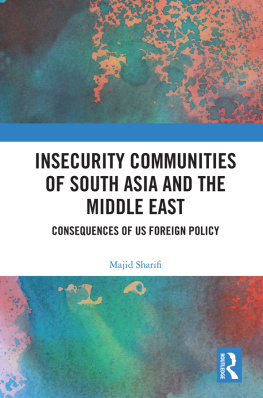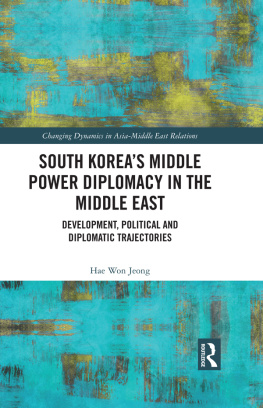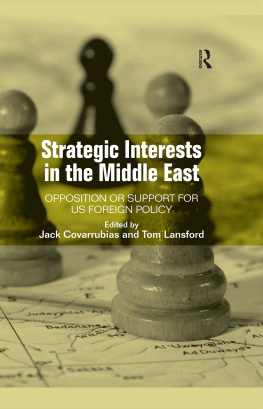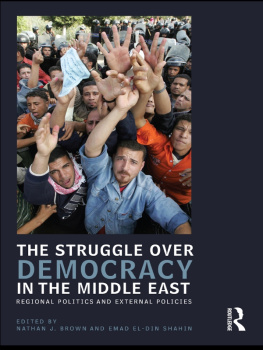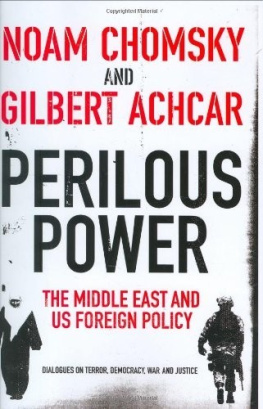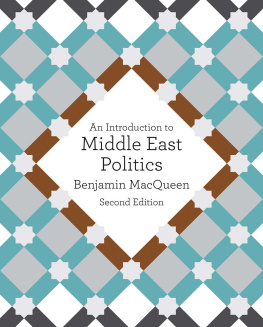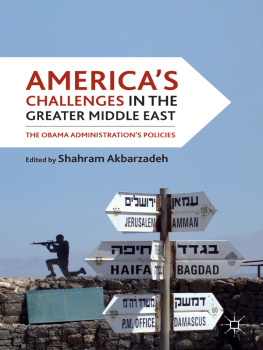US FOREIGN POLICY IN THE MIDDLE EAST
Over the last 60 years, Washington has been a major player in the politics of the Middle East. From Iran in the 1950s, to the Gulf War of 1991, to the devastation of contemporary Iraq, US policy has had a profound impact on the domestic affairs of the region. Anti-Americanism is a pervasive feature of modern Middle East public opinion. But, far from being intrinsic to Muslim political culture, scepticism of the US agenda is directly linked to the regional policies pursued by Washington.
By exploring critical points of regional crisis, Kylie Baxter and Shahram Akbarzadeh elaborate on the links between US policy and popular distrust of the United States. The book also examines the interconnected nature of events in this geostrategically vital region. Accessible and easy to follow, this book is designed to provide a clear and concise overview of complex historical and political material. Key features include:
maps illustrating key events and areas of discontent;
text boxes on topics of interest related to the ArabIsraeli wars, Iranian politics, foreign interventions in Afghanistan and Iraq, the wars of the Persian Gulf, September 11 and the rise of Islamist movements; and
further reading lists and a selection of suggested study questions at the end of each chapter.
US Foreign Policy in the Middle East: The roots of anti-Americanism provides students and researchers insight into the popular discontent generated by decades of US policy in the Middle East.
Dr Kylie Baxter is a researcher at the National Centre of Excellence for Islamic Studies, the University of Melbourne, Australia. Her research focuses on Islamic politics and conflict in the Middle East. She is also the author of British Muslims and the Call to Global Jihad (Melbourne: Monash Asia Institute Press, 2007).
Associate Professor Shahram Akbarzadeh is Deputy Director of the National Centre of Excellence for Islamic Studies, the University of Melbourne, Australia. His research focuses on Australian Muslims, international relations and Islamic politics. He is also the author of Uzbekistan and the United States: Islamism, Authoritarianism and Washingtons Security Agenda (London: Zed Books, 2005).
US FOREIGN POLICY IN THE MIDDLE EAST
The roots of anti-Americanism
Kylie Baxter and Shahram Akbarzadeh

First published 2008
by Routledge
2 Park Square, Milton Park, Abingdon, Oxon, OX14 4RN
Simultaneously published in the USA and Canada
by Routledge
711 Third Avenue, New York, NY 10017
Routledge is an imprint of the Taylor & Francis Group, an informa business
2008 Kylie Baxter and Shahram Akbarzadeh
Typeset in Garamond by Prepress Projects Ltd, Perth, UK
All rights reserved. No part of this book may be reprinted or reproduced or utilised in any form or by any electronic, mechanical, or other means, now known or hereafter invented, including photocopying and recording, or in any information storage or retrieval system, without permission in writing from the publishers.
British Library Cataloguing in Publication Data
A catalogue record for this book is available from the British Library
Library of Congress Cataloging in Publication Data
Baxter, Kylie.
US foreign policy in the Middle East : the roots of anti-americanism / Kylie Baxter and Shahram Akbarzadeh.
p. cm.
Includes bibliographical references and index.
ISBN-13: 978-0-415-41048-9 (hardback)
ISBN-13: 978-0-415-41049-6 (pbk.)
[etc.]
1. United StatesForeign relationsMiddle East. 2. Middle EastForeign relationsUnited States. 3. United StatesForeign public opinion, Middle Eastern. 4. Middle EastPublic opinion.
I. Akbarzadeh, Shahram. II. Title. III. Title: United States foreign policy in the Middle East.
DS63.2.U5B37 2008
327.73056--dc22
2007042998
ISBN 13: 978-0-415-41048-9 (hbk)
ISBN 13: 978-0-415-41049-6 (pbk)
ISBN 13: 978-0-203-92830-1 (ebk)
CONTENTS
4 Islamism and the Iranian Revolution
8 The Iraq Adventure and Arab Perceptions of the Unites States
MAPS
ACKNOWLEDGEMENTS
The authors would like to thank the School of Political and Social Inquiry at Monash University for its support during the development of US Foreign Policy in the Middle East: The roots of anti-Americanism. Thanks also to Rebecca Barlow and Abhijit Mitra of the Centre for Muslim Minorities and Islam Policy Studies staff for their invaluable research assistance. Finally, we would like to express our appreciation to the students of Monash University for their lively debate and sustained enthusiasm for Middle Eastern studies, which helped us develop and refine this book.
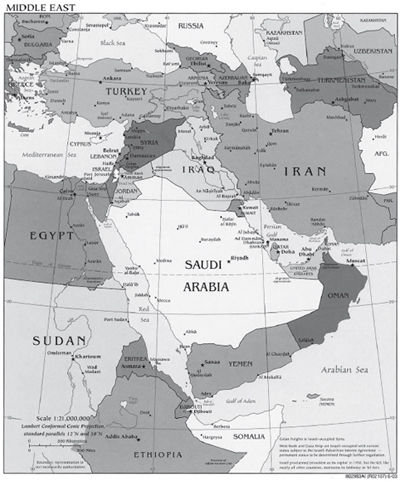
The Middle East. Reproduced with permission from the UN Cartographic Section.
Introduction
The United States of America occupies a central place in global politics. As the sole superpower, the United States is able to exert an unrivalled influence in the international system. Indeed, some social commentators believe that America affects, directly and indirectly, the lives of every individual, community and nation on the planet (Sardar and Davies 2002: 58). As is the case with all great powers, this pervasive presence has triggered a range of responses, and states and leaders throughout the international system in part define themselves on the basis of their relationship to Washington. History demonstrates that a unipolar system often engenders concerns about the great powers use of its influence. Thus, Washingtons rise as the global power-broker has led to a concurrent rise in anti-Americanism.
Anti-Americanism is a complex social and political mindset that permeates the political discourse of many parts of the global community. In recent decades, anti-Americanism has become most closely associated with the Muslim Middle East. The extensive research carried out by the Pew Research Center confirms that, whereas public perceptions of the US have been largely negative for decades, in recent years that broad dislike has taken on an aspect of outright fear (Pew Research Center 2005). In the aftermath of the terrorist attacks of September 11, 2001, it appeared to many Westerners that Middle Eastern anti-Americanism had entered a new and violent chapter. As social pundits rushed to ask why do they hate us?, more nuanced voices attempted to contextualize this violent explosion of anti-American sentiment within a long and complex history of US foreign policy and intervention in the Middle East. In a political climate marked by fear and uncertainty this was not an easy task.
The United States has been a major force in Middle Eastern politics since the 1950s. Following the close of the Cold War, Washington emerged as the regions major power-broker, often as influential in local decision-making processes as the regional states themselves. In addition to its political influence, the United States displayed an increasing willingness to apply more traditional hard power tools to further its regional agenda. US foreign policy is conceived and implemented in order to advance the national interest of the state. This is true of the foreign policy of every state in the international system. The difference lies in the special position the United States currently occupies in international relations. In the post-Cold War world, the United States is a hyperpower, essentially a state capable and prepared to exert its political or military will in a unilateral manner (Litwak 2002). In the unipolar world that emerged in the late twentieth century, Washington displayed a marked tendency to direct its power and influence toward the Middle East. This is a result of the regions geo-strategic importance, its energy reserves and its often unstable political climate. The constant presence of the United States as a military force, political power and a controversial cultural icon has engendered a range of regional responses. Anti-Americanism is one such response.
Next page
